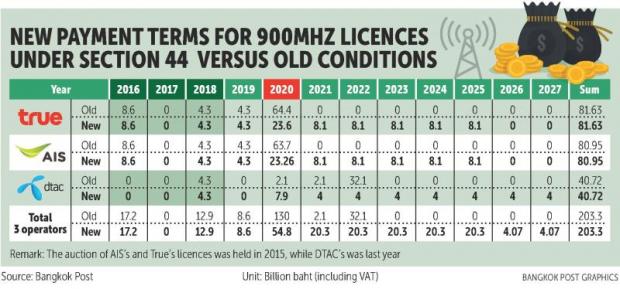
Four or five digital TV operators plan to return their operating licences and go off the air after the government's decision on Thursday to invoke Section 44, which allows all existing digital TV operators to exit the segment without having to pay the remaining licence payments or face any additional financial penalties.
The government will waive the remaining two terms of licence payments for all digital TV operators, as well as subsidise rental fees for broadcasting networks (MUX) for the remaining nine years of the digital TV licences.
Takorn Tantasith, secretary-general of the National Broadcasting and Telecommunications Commission (NBTC), insisted that a reasonable reserve price for the planned 700-megahertz licence auction in June is necessary to attract prospective bidders and facilitate 5G adoption in the country.
"The reserve price for the 700MHz licence auction will be based on the real value of the spectrum range, not the winning prices of previous auctions, as the 900MHz auction prices ended up being too high," Mr Takorn said.
"The NBTC is thankful for the government's decision, as it directly resolves the existing deadlock in terms of both digital TV operators' financial burden and telecom operators' burden for 900MHz licence payments.
"Section 44 clears the burden for both industries."
STAY OR WALK
Regarding the digital TV business, Mr Takorn said Section 44 aims to ease the financial burden for TV operators through two assistance initiatives, by waiving the remaining two terms of their licence payments and subsidising their MUX rental fees throughout their licence terms.
More importantly, Section 44 lets existing digital TV operators walk away from the business without any requirements from the state.
Mr Takorn said digital TV operators have paid a combined 34.6 billion baht to the NBTC for their licence payments, or 66%, while the remainder is worth about 13 billion baht.
"Section 44 was passed to ease major operating costs for TV operators and facilitate business competition among rapidly changing innovative platforms such as over-the-top (OTT) services," he said. "However, TV operators that decide not to continue operating can walk away from their businesses too."
Assistance to digital TV operators and telecom operators is closely related, Mr Takorn said.
PAYMENTS DELAYED
He said the major three telecom operators -- AIS, True Move and DTAC -- will be allowed to extend their licence payment terms, provided they participate in the planned 700MHz auction.
"The NBTC believes that major telecom operators will participate in the planned 700MHz auction in exchange for a delay in their licence payment instalments," Mr Takorn said.
He suggested that the reserve price for a 700MHz licence might be around 7 billion baht for 5MHz of bandwidth.
The NBTC is on the verge of auctioning 45MHz on the 700MHz band, divided into nine slots of 5MHz.
"The reserve price for the previous auction of 900MHz licences last year was 38 billion baht for 5MHz, which was based on the winning price in the 900MHz auction in 2015," Mr Takorn said.
He said the NBTC is calling on all digital TV operators and the three major telecom operators to attend an information discussion on April 17 after all related parties acknowledge the Section 44 announcement.
MUCH-NEEDED CLARITY
Pravit Leesatapornwongsa, an NBTC commissioner, said that regarding Section 44, digital TV licence holders could transfer their licences, but the latest regulation only permits the return of the licences. Transfers remain unclear.
Some digital TV operators have already had to abort their businesses, and Section 44 finally gives clarity on what will become of these businesses.
He said the decision has cleared the air about whether digital TV operators should keep paying licence fees or give up their licences.
Mr Pravit said the National Council for Peace and Order (NCPO) has a lawsuit with Thai TV channel, owned by media veteran Pantipa Sakulchai, the president of Thai TV.
Although Thai TV has ceased operations, the company has had to continue to pay for its digital TV licence for 15 years, as stipulated in the auction. At present, the case is being tried in the Supreme Court.
If there is a digital TV company that ceases operations, the NCPO has had to call on the company to pay, as in this case. Section 44 has provided more clarity that digital TV operators which return the operating licence don't have to continue to make the remaining payments, removing the need for the lawsuit.
Suphab Kleekachai, president of the Association of Digital TV Broadcasting, said digital TV operators have been waiting for the regulation to become official to return the licences.
Many operators previously sought to return licences, but when the Section 44 order came down, some operators changed their mind to continue business, citing the part of the order that allows existing operators not to pay licence and network fees for the next 10 years.
Operators still have to await further clarification from the NBTC. The case of compensation payments is also considered another reason for the operators to return their licences.
